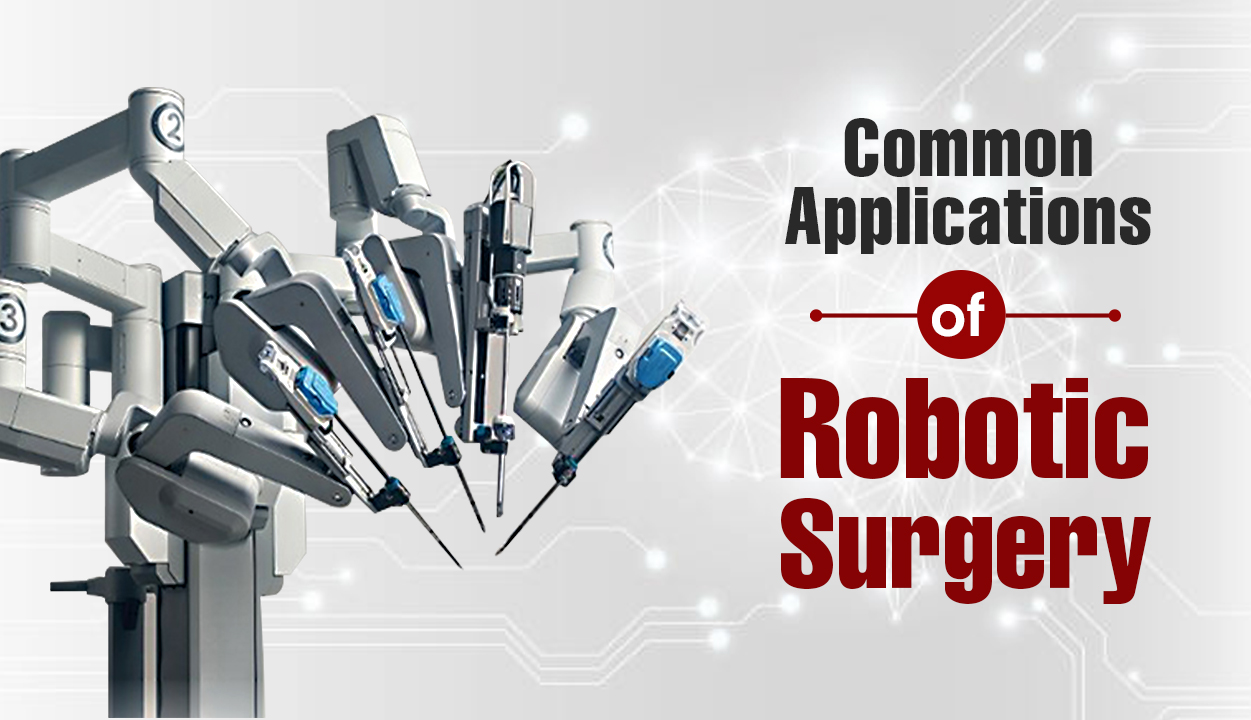
Common Applications of Robotic Surgery
Robotic surgery, also known as robot-assisted surgery, is a cutting-edge medical technology that enables surgeons to perform intricate procedures with unparalleled precision. Robotic surgery has emerged as a pioneering force, reshaping the way we approach medical procedures. It involves using robotic equipment to assist healthcare professionals during surgeries, typically through small incisions, which reduces stress and pain in the patient’s body.
With its precision, enhanced agility, and minimally invasive capabilities, robotic surgery is making significant strides across various medical specialties. In this blog, we will explore the common applications of robotic surgery in fields such as General Surgery, Urological Surgery, Gynecological Surgery, Colorectal Surgery and more.
Minimally Invasive Surgery: Robotic surgery is widely used for minimally invasive procedures. It allows surgeons to make smaller incisions, reducing trauma to the patient’s body. Common procedures in this category include robotic hernia repair and robotic gallbladder removal.
- Robotic Hernia Repair: Using the robotic instruments, the surgeon repairs the hernia. This may involve repositioning the protruding tissue or organ, strengthening the weakened abdominal wall, and closing the hernia defect.
- Robotic Gallbladder Removal: It involves making small incisions and using robotic instruments to remove the gallbladder, typically due to gallstones or other gallbladder issues.
Gynecological Surgery:
- Robotic Hysterectomy: It is often used to treat conditions such as uterine fibroids, endometriosis, or cancer.
- Ovarian Cystectomy: Robotic surgery performed to remove ovarian cysts while preserving the ovary and reducing the risk of fertility issues.
- Ureteral Reimplantation: The procedure involves repositioning the ureter to ensure proper urine flow from the kidneys to the bladder
- Endometriosis Resection: A procedure to remove endometrial tissue that has grown outside the uterus, causing pain and other symptoms.
Urological Surgery:
- Robotic Prostatectomy: It is a minimally invasive surgery for treating prostate cancer as it involves the removal of the prostate gland
- Nephrectomy: Robotic procedure to remove a kidney, either partially (partial nephrectomy) or completely (radical nephrectomy).
- Renal Transplant: Robotic renal transplant, or robotic-assisted kidney transplant, is a surgical method used for kidney transplantation. The surgeon uses robotic assistance to connect the donor kidney to the recipient’s blood vessels and bladder.
- Pyeloplasty: It is to correct a blockage in the renal pelvis, often caused by a congenital condition. It involves the removal of the obstruction and reconstruction of the urinary tract leading to improved urinary flow and shorter recovery times.
General Surgery: General surgery procedures benefit from robotic assistance, with applications such as robotic colon and bariatric surgery.
- Robotic Colon Surgery: Robotic colon surgery is a minimally invasive approach to treat conditions in the colon, such as colorectal cancer or diverticulitis.
- Bariatric Surgery: It involves procedures like gastric bypass or sleeve gastrectomy, performed with robotic assistance to reduce complications, promote weight loss, and enhance patient outcomes.
Colorectal Surgery, Gastro Intestinal and Hepato Pancreato Biliary Surgery (GI & HPB):
- Colorectal Surgery: Colorectal surgery focuses on the treatment of conditions affecting the colon and rectum. Using robotic technology, surgeons can perform for colorectal cancer, diverticulitis, and inflammatory bowel disease.
- Gastro Intestinal and Hepato Pancreato Biliary Surgery (GI & HPB): GI & HPB surgery encompasses procedures related to the digestive system, liver, pancreas, and bile ducts.
These are just a few examples of the common applications of robotic surgery. The technology is continuously evolving and expanding its reach in the medical field, offering patients the benefits of reduced pain, faster recovery, and shorter hospital stays. With its continued evolution, the future of healthcare is both promising and exciting, ensuring better outcomes for patients in diverse medical fields.
Need surgery? Consult our specialized doctor and Book an appointment here – http://182.9.136.75:62/7
